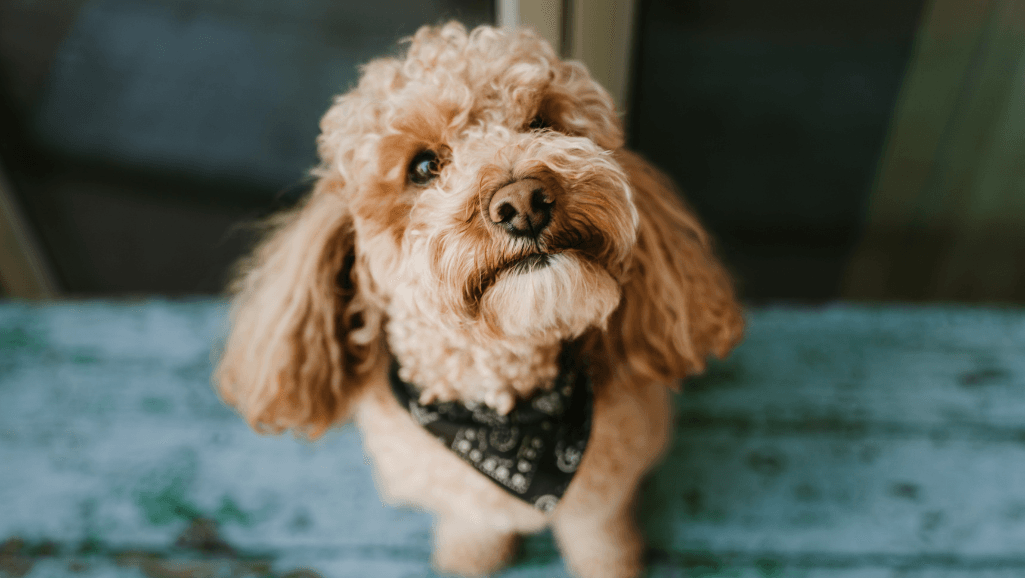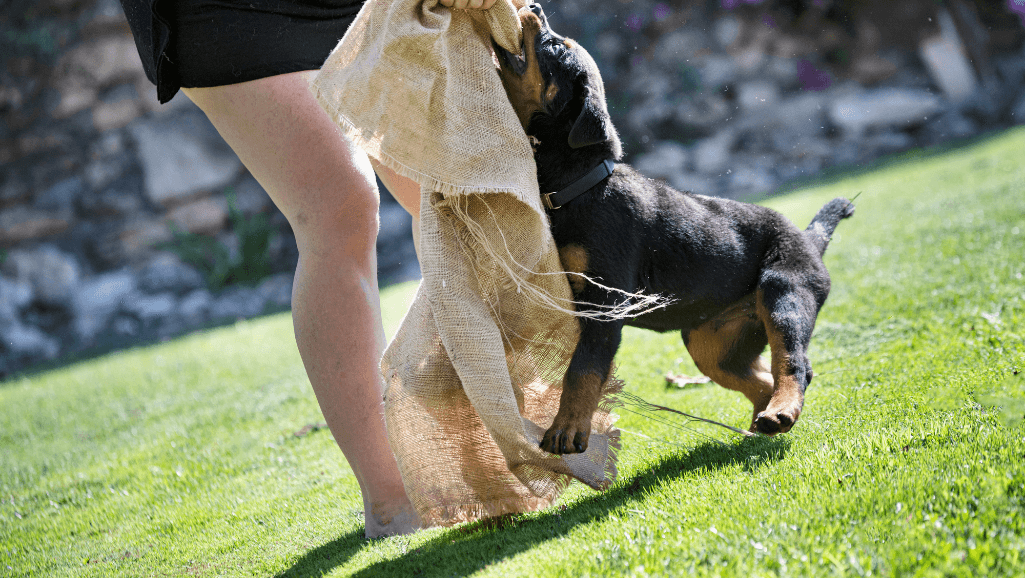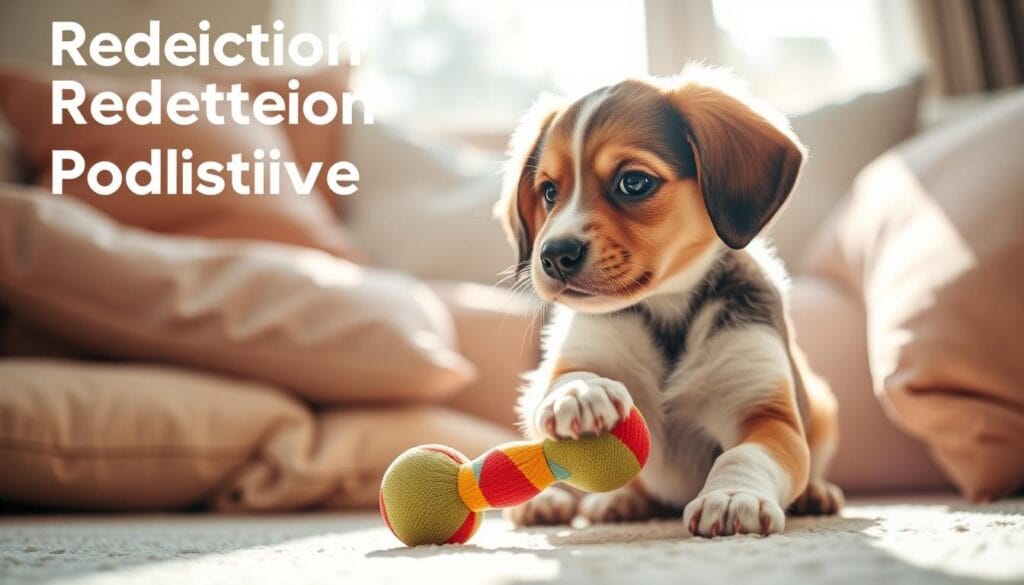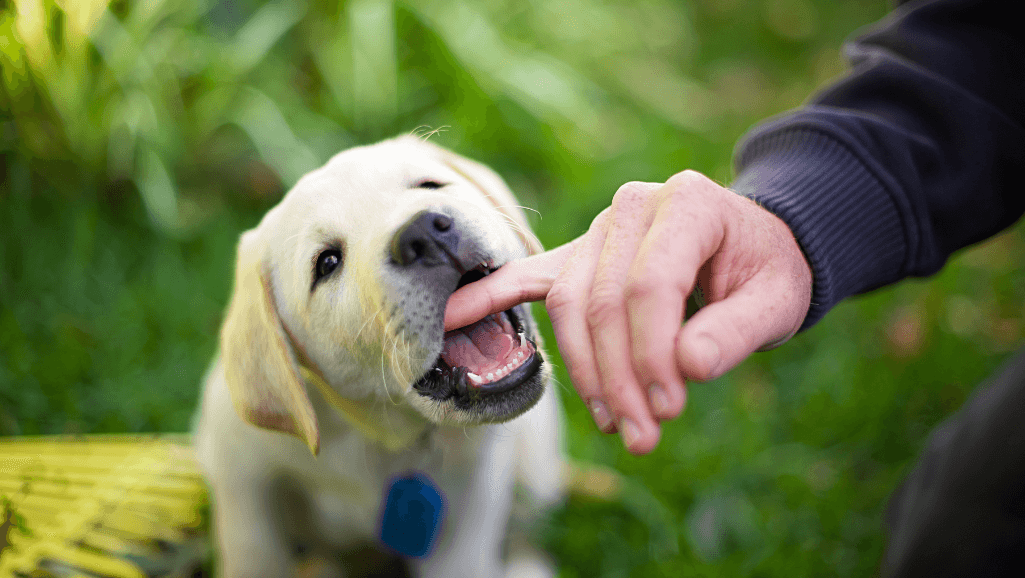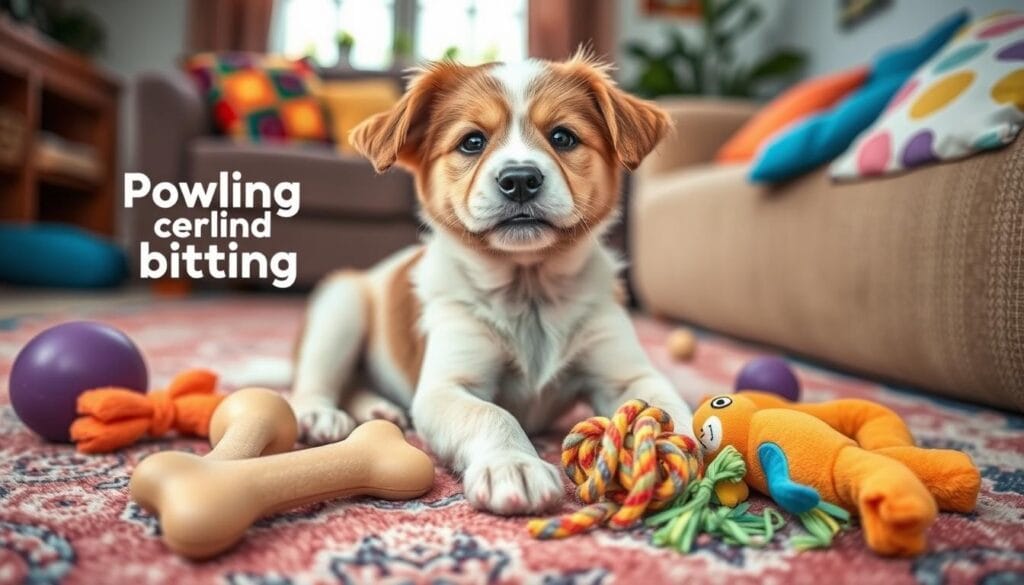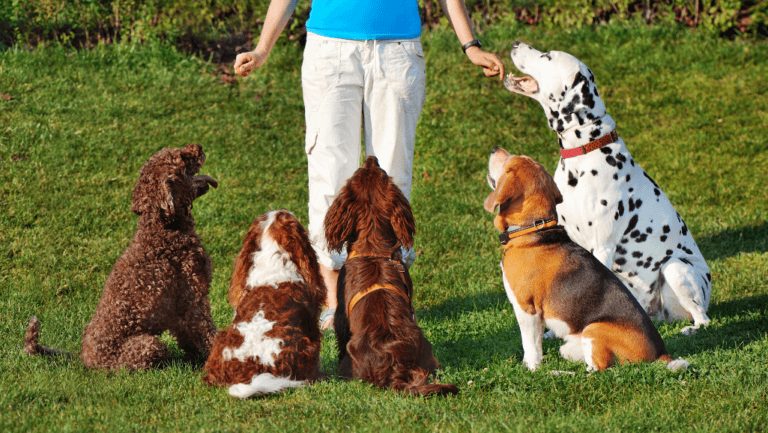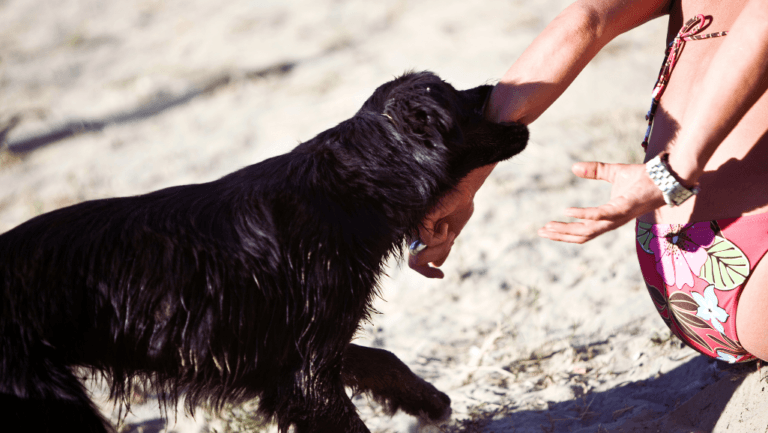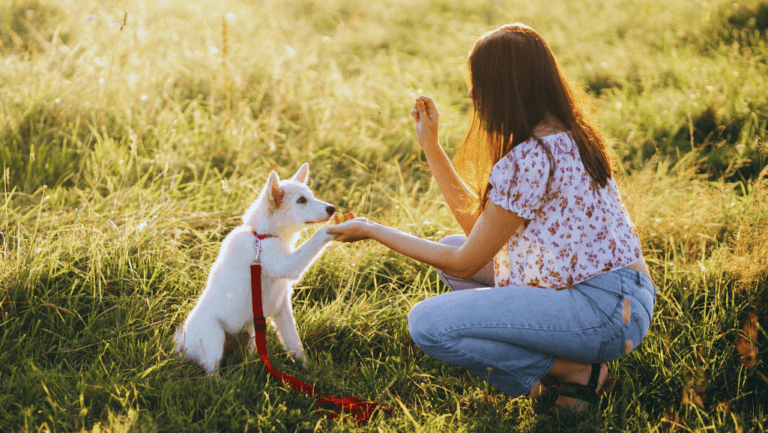Stopping a puppy from biting is key for a peaceful home and everyone’s safety. This guide helps you teach your puppy not to bite. It’s a basic part of puppy behavior training. Using effective puppy training techniques can teach your puppy good habits for life.
Puppies bite for reasons like teething and exploring. Knowing this helps owners understand and manage their behavior. Teaching puppies not to bite early helps them grow up without aggressive habits. With the right training, you can help your puppy grow up well.
For more tips on stopping puppy biting, check out PetMD. They have lots of advice on how to manage your puppy’s biting.
Key Takeaways
- How to Get a Puppy to Stop Biting.
- Early implementation of bite inhibition is pivotal to preventing future aggressive behavior in dogs.
- Effective use of chew toys can significantly redirect unwanted biting habits.
- Positive reinforcement strategies encourage good behavior and reduce biting incidents.
- Consistency in training and responses to biting plays a vital role in behavior modification.
- Professional guidance and personalized pet advice can be beneficial in curbing biting behavior.
- Appropriate socialization and exercise are key elements in a holistic approach to managing puppy biting.
- Starting training early, ideally around 8-10 weeks, maximizes learning and behavior shaping.
Understanding Puppy Biting Behavior
It’s important to tackle puppy biting early on. These behaviors, like puppy mouthing behavior and puppy play biting, are key to their growth. They help puppies learn and grow. By understanding why they bite and using the right training, you can teach them better manners.
Exploring the World with Their Mouths
Puppies start exploring with their mouths almost from the start. They have 28 tiny teeth that help them learn about textures and objects. Puppy behavior management at this time means guiding them and stopping bad behaviors. It’s important to remember that this is a normal part of their learning.
The Teething Process and Biting
When puppies are 12 to 16 weeks old, they start teething. This is a painful time as their adult teeth come in. Puppy teething tips include giving them chew toys and using taste deterrents. This helps them manage their biting and reduces unwanted behavior.
Play Biting Amongst Littermates
Play biting is how puppies learn to control their bites. It’s a way for them to figure out how hard to bite without hurting others. This skill is crucial for their development. Activities like AKC S.T.A.R. Puppy classes help them learn this.
Understanding puppy mouthing behavior and managing it is key. This ensures they grow into well-behaved dogs. Early intervention with the right training is essential to avoid future problems.
Establishing Foundations of Bite Inhibition
Teaching a puppy is more than just basic commands. It’s about learning behavioral control. Bite inhibition training for puppies is key to stopping aggressive behavior early. Knowing how to teach puppies not to bite keeps everyone safe.
Starting early helps puppies learn to control their bites. This is important to avoid injuries. Teaching bite inhibition helps your puppy grow into a well-adjusted adult dog.
What is Bite Inhibition?
Bite inhibition means a dog knows how hard to bite. Puppies learn this from their siblings during play. If a puppy bites too hard, its sibling’s yelp teaches it to be gentler.
Techniques to Teach Control and Reduce Force
- Emulate the natural response: When a puppy bites too hard, respond with a high-pitched yelp to discourage further biting, recreating the instinctual feedback puppies would receive from their littermates.
- Redirect their energy: If vocal feedback stimulates more biting, redirect the puppy’s attention to chew toys instead of your hands or clothes, as recommended by training experts at ReadyPupGo.
- Implement time-outs: Brief separation or calm time-outs can also be effective in teaching puppies that rough play results in ending fun interaction, reinforcing gentler play behavior.
Responding to Puppy Biting with Consistent Consequences
Responding to puppy biting needs consistent actions from the owner. The “Three Strikes, You’re Out” method teaches puppies to play gently. It shows that rough play ends the fun. Obedience training also helps by channeling their energy positively.
Correcting puppy behavior early is crucial. Properly socialized and trained dogs show the care and patience they received. So, teaching bite inhibition is key for a well-behaved pet.
Positive Reinforcement and Redirecting Biting Behavior
Dealing with puppy biting needs a focus on positive methods. Positive reinforcement training for puppies is key. It makes learning fun and encourages good behavior with rewards and praise.
Redirecting to Appropriate Chew Toys
Redirecting puppy behavior is vital. Puppies need to explore with their mouths. Giving them chew toys stops them from biting hands and furniture.
The effectiveness of redirecting puppies to chew toys is well-known. These toys keep them busy and help with teething pain.
Addressing Biting in Play without Physical Punishment
Handling puppy mouthing needs care. Physical punishment can harm and scare them. Instead, use toys or games like “Find It” to redirect puppy behavior.
The Importance of Praising Positive Behavior
Praise is crucial in positive reinforcement training for puppies. When a puppy picks a toy over biting, praise them. This encourages good behavior and strengthens your bond.
In summary, positive training, redirection, and praise are key. They help discourage puppy biting and teach them to be well-behaved. These methods solve the problem of biting and meet their needs for play and learning.
How to Get a Puppy to Stop Biting
Training a biting puppy needs a mix of firm and gentle methods. These methods help the puppy learn not to bite too hard. Dr. Carley Faughn and Bradley Phifer suggest starting with clear, consistent training early on.
Bradley Phifer, CBCC-KA, says to redirect biting to toys or chew bones. This keeps their teeth off people and helps with teething pain. It solves two problems at once.
- Immediate Cease of Play: Stop playtime with a brief time-out for hard bites. This teaches the puppy that biting stops fun.
- Consistent Positive Reinforcement: Praise or give treats when they choose toys over biting hands. This teaches them biting toys is good, not biting people.
- Socialization: Puppy classes are key. They teach social skills and reinforce not biting through play with other puppies.
Preventing puppy biting also means everyone in the family must help. Dog-trainer Tom Dokken says it’s important for all family members to train together. This sends a clear message to the puppy. A light pinch under the jaw when they bite teaches them biting is wrong.
In summary, training a biting puppy needs patience, consistency, and the right methods. Using time-outs, redirecting to chew toys, and socializing are all important. The goal is to teach the puppy what is acceptable in a gentle way.
Puppy Mouthing Prevention Strategies and Tools
Stopping puppy mouthing and nipping solutions needs many steps. This includes changing how they behave and their environment. It’s key to teach them early and use the right tools to prevent bad habits.
Effective Use of Taste Deterrents and Puppy-Proofing
To stop puppy biting behavior, taste deterrents work well. These products tell puppies not to chew on things like furniture or skin. Also, making your home puppy-proof is vital. You need to keep things safe and out of reach that could harm them or lead to bad habits.
Providing Alternative Activities to Curb Biting
Changing puppy chewing behavior to better options is key. Give them tough chew toys, puzzle feeders, or play games like tug-of-war. These activities keep them busy and teach them what’s okay to chew on. It helps with puppy teething remedies and makes sure they play right.
The Role of Quiet Time and Physical Exercise
Enough exercise and quiet time help a lot. Active play burns off energy that might lead to biting. Also, having a calm place for them to rest helps. It makes them less likely to bite when they’re stressed.
Using these strategies, training, and patience helps manage mouthing. This sets them up for a happy, well-adjusted adult life.
Conclusion
Stopping puppy nipping and curbing biting habits are key to puppy behavior modification. Puppies learn by mouthing things, especially during teething from 3 to 6 months. They need to learn to bite gently and find the right ways to bite.
Effective puppy discipline combines a structured environment and consistent exercise. This helps reduce biting and nipping. Positive reinforcement for good behavior is also crucial.
Remember, puppies may bite more during adolescence. So, it’s important to keep using toys and setting clear rules. If problems continue, getting help from a dog trainer or behavior specialist is a good idea.
If basic methods don’t work, or if the biting is aggressive, seek professional help. With patience and the right techniques, your puppy will grow into a loving family member.

